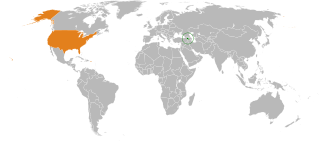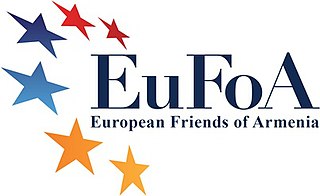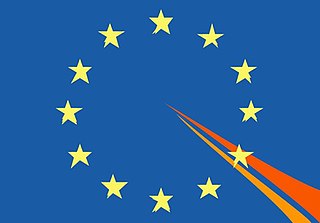Articles related to Armenia include:

The Armenian National Committee of America (ANCA) is an Armenian American grassroots organization. Its headquarters is in Washington, D.C., and it has regional offices in Glendale, California, and Watertown, Massachusetts.

The Nagorno-Karabakh conflict is an ethnic and territorial conflict between Armenia and Azerbaijan over the region of Nagorno-Karabakh, inhabited mostly by ethnic Armenians until 2023, and seven surrounding districts, inhabited mostly by Azerbaijanis until their expulsion during the 1990s. The Nagorno-Karabakh region was entirely claimed by and partially controlled by the breakaway Republic of Artsakh, but was recognized internationally as part of Azerbaijan. Azerbaijan gradually re-established control over Nagorno-Karabakh region and the seven surrounding districts.

The Republic of Artsakh was a republic with limited recognition in the South Caucasus region. The Republic of Artsakh controlled most of the territory of the former Nagorno-Karabakh Autonomous Oblast. It was recognized only by three other non-UN member states, Abkhazia, South Ossetia and Transnistria. The rest of the international community recognized Artsakh as part of Azerbaijan. In November 2012, a member of Uruguay's foreign relations committee stated that his country could recognize Nagorno-Karabakh's independence. In 2012, Armenia and Tuvalu established diplomatic relations, which led to speculation of possible recognition of Artsakh by Tuvalu. In October 2012, the Australian state of New South Wales recognized Nagorno-Karabakh. In September 2014, the Basque Parliament in Spain adopted a motion supporting Artsakh's right to self-determination and in November 2014, the Parliament of Navarre, also in Spain, issued a statement supporting Artsakh's inclusion in taking part in settlement negotiations.
The Assembly of Turkish American Associations (ATAA), created in 1979, is the umbrella organization whose stated purpose is to promote cooperation between the social and cultural Turkish American organizations around the United States. ATAA informs the Turkish American community on how to foster Turkish-American relations and promotes a positive view of Turkey. The organization is also known for its unsuccessful lawsuits arguing for the inclusion of Armenian genocide denial as a legitimate alternate view in the US educational curriculum.
Ani is a ruined Armenian medieval city in Turkey.

The dissolution of the Soviet Union in December 1991 brought an end to the Cold War and created an opportunity for establishing bilateral relations between the United States with Armenia and other post-Soviet states as they began a political and economic transformation. The United States recognized the independence of Armenia on 25 December 1991, and opened an embassy in Armenia's capital Yerevan in February 1992.
The Armenian American lobby is the diverse coalition of those who, as individuals and as groups, seek to influence the United States foreign policy in support of Armenia, Armenians or Armenian policies. One of its primary goals is for the United States to recognize the Armenian genocide, but the Turkish lobby have, until recently, successfully lobbied against this.
The Turkey lobby in the United States is a lobby that works on behalf of the Turkish government in promoting that nation's interests with the United States government.
The Armenian National Institute (ANI) is a Washington, D.C.–based organization dedicated to the research of Armenian genocide. It was founded in 1997 by the Armenian Assembly of America to bring more awareness to the Armenian genocide. The abbreviation of the Institute, ANI, is the name of the medieval capital of Armenia.

The political status of Nagorno-Karabakh remained unresolved from its declaration of independence on 10 December 1991 to its September 2023 collapse. During Soviet times, it had been an ethnic Armenian autonomous oblast of the Azerbaijan Soviet Socialist Republic. Following the dissolution of the Soviet Union, a conflict arose between local Armenians who sought to have Nagorno-Karabakh join Armenia and local Azerbaijanis who opposed this.

The European Armenian Federation for Justice and Democracy (EAFJD) is a grassroots umbrella organization which represents a significant part of the Armenian diaspora in Europe. The EAFJD is the main interlocutor promoting Armenian issues in the European Union and other international organizations.

The European Friends of Armenia (EuFoA) is an international non-governmental organization established in 2009, which aims to promote cooperation between the European Union and Armenia.

Bilateral relations exist between Italy and Armenia. Italy has an embassy in Yerevan and Armenia has an embassy in Rome. Both countries are full members of the Council of Europe and the OSCE.
The Congressional Armenian Caucus (CAC) is an organization of over 100 members of the United States Congress. The Caucus is dedicated to keeping members of Congress engaged on Armenia-related issues as well as strengthening and maintaining the US-Armenia relationship. In particular, the Congressional Armenian Caucus aims to increase US aid to Armenia and Artsakh, recognise the Armenian genocide and to recognise the independence of Artsakh. The CAC was founded in 1995. Although the majority of the members are from the Democratic Party, there are also members from the Republican party including Co-Chairs Gus Bilirakis and David Valadao.
During its existence, the Republic of Artsakh and the United States did not have official diplomatic relations as the United States was among the vast majority of countries that did not recognize Artsakh as a sovereign nation and instead recognized the region of Artsakh, or Nagorno-Karabakh, as part of Azerbaijan. Despite no formal relations, the Republic of Artsakh had a representative office in Washington, D.C. since November 1997. It is not known whether the office still functions after the apparent dissolution of Artsakh.

The Assembly of Armenians of Europe (AAE) is a pan-European international organization.

European Integration NGO is an Armenian non-governmental organization based in Yerevan. The organization was founded in 2000 and seeks to promote further European integration of Armenia.

GALAS LGBTQ+ Armenian Society is one of the first LGBTQIA+ rights non-governmental organizations founded by Armenian Americans. GALAS was founded in 1998 and is headquartered in West Hollywood, California. Its mission is to serve and support the needs of lesbian, gay, bisexual, transgender and queer individuals of Armenian descent, to promote their human rights protection, and to advocate for the change of public policy around LGBTQ+ issues.

The blockade of Nagorno-Karabakh was an event in the Nagorno-Karabakh conflict. The region was disputed between Azerbaijan and the breakaway Republic of Artsakh, internationally recognised as part of Azerbaijan, which had an ethnic Armenian population and was supported by neighbouring Armenia, until the dissolution of Republic of Artsakh on 28 September 2023.












